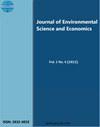尼日利亚卡拉巴校区克罗斯河大学学生用水模式
引用次数: 2
摘要
该研究分析了尼日利亚卡拉巴尔校区克罗斯河大学学生的用水模式。具体来说,这项研究考察了水的消耗程度和方式。本研究的数据是通过访谈、观察和问卷调查获得的。在引出数据。在宿舍共分发了300份问卷。为了对所调查的情况有一个总的印象,在男青年旅舍分发了150份调查表,在女青年旅舍也分发了同样的调查表。数据分析使用描述性统计,如频率,简单百分比和平均值。5点李克特量表用于了解某些变量对研究区域用水量的影响程度。该研究指出,用水量受到性别和年龄的显著影响。例如,该研究强调,女性比男性消耗更多的水。同样,18岁和25岁以下的学生在用水者中所占比例较大。还指出,宿舍学生的用水量受到一天中特定时段的影响。例如,早晨的饮水量被观察到比一天中的其他时段要高。此外,洗澡所消耗的水量最大,而饮用所消耗的水量最少。基于以上观察,有人建议改善供学生饮用的水的质量,以便让学生饮用。最后,应按要求的数量和定期供应。关键字;宿舍、学校环境、水量/水质、需水量、供水量、本文章由计算机程序翻译,如有差异,请以英文原文为准。
Pattern of Water Consumption among Students in Cross River University, Calabar Campus, Nigeria
The study analysed the pattern of water consumption among students in Cross River University, Calabar Campus, Nigeria. Specifically, the study examine the extent and ways water is consumed. Data for the study were obtained using interviews, observations and questionnaire.in eliciting data. A total of 300 copies of questionnaire were distributed in the residential hostels. In order to have a general impression of the situation under investigation, 150 copies of questionnaire were distributed in male hostels and same were distributed in female hostels. Data were analysed using descriptive statistics such as frequencies, simple percentages and means. A 5-point likert scale was used in understanding the level in which certain variables contribute in water consumption in the study area. The study noted that water consumption was significantly influenced by gender and age. For instance, the study highlighted that females consumed larger water quantity than males. Equally, students within the ages of 18 years and 25 years constitute larger percentage of water consumers. It was also noted that water consumption among students in the hostels was influenced by particular periods of the day. For instance, the quantity of water consumed in the morning was observed to be higher than in other periods of the day. Furthermore, bathing account for the largest quantity of water consumption while drinking constitute the least. Based on the above observations, it was suggested that the quality of water that is supplied for consumption be improved so as to allow students to drink. Finally, should be supplied at required quantity and regularly.
Keywords; Hostels, school environment, quantity/quality of water, water demand, water supply,
求助全文
通过发布文献求助,成功后即可免费获取论文全文。
去求助
来源期刊

Journal of Environmental Science and Economics
Environmental Economics-
自引率
0.00%
发文量
0
期刊介绍:
Journal of environmental science and economics (JESCAE), ISSN: 2832-6032 is an open access peer-reviewed journal that considers articles and reviews articles on all aspects of environmental economics.
Aim and Scope
Journal of Environmental Science and Economics is an international scholarly refereed research journal that aims to promote the theory and practice of environmental economics, Sustainability research, technological innovation, and economics. A broad outline of the journal''s scope includes; peer-reviewed original research articles, case, and technical reports, reviews and analyses papers, short communications and notes to the editor, in interdisciplinary information on the practice and status of research in environmental science, sustainability, technological innovations, and economics.
The main aspects of research areas include, but are not limited to; Environmental pollution control and abatement technology, Sustainable and economic Development, sustainable consumption and Sustainability, Environmental and sustainability assessment, transport and fate of pollutants in the environment, concentrations and dispersion of wastes in air, water, and non-point sources pollution, atmospheric pollutants and trace gases, environmental impact assessment, industrial ecology, ecological and human risk assessment; improved energy management and auditing efficiency and environmental standards and criteria.
 求助内容:
求助内容: 应助结果提醒方式:
应助结果提醒方式:


